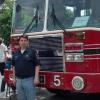-
Content count
5 -
Joined
-
Last visited
Everything posted by Pleasantville_165
-

Pleasantville_165 replied to NorthEndExpress's topic in Westchester County Area Emergency Services News
I came across this article in the New York Times archive a while back. It gives an interesting history of mutual aid in Westchester in its early days, and about the dispatch center that became 60-Control. Some things never seem to change... May 24, 1953 _______________________________ PLAN FOR FIRE AID NOW 25 YEARS OLD Westchester System Has 750 Paid and 9,000 Volunteer Firemen for Emergencies Special to THE NEW YORK TIMES MAMARONECK, N. Y., May 23 No longer do Westchester County firemen of one district sit stolidly by while a house burns fifty feet away- in an adjoining district. In 1921, a man died in an apartment house fire because Scarsdale and Yonkers fire officials, after a jurisdictional dispute, responded belatedly to a boundary-line blaze. A year later came the organization of the Westchester Fire Chiefs Emergency Plan, under which the 750 paid firemen and 9,000 volunteers of sixty-one districts are organized for mutual aid in the event of an emergency-a conflagration, flood, hurricane, train wreck, building collapse, explosion or war. The plan celebrated its silver anniversary this week with a dinner and installation of officers at Lawrence Inn on Boston Post Road here. Chief Edward J. MacDonald of White Plains succeeded Chief Joseph Carroll of Montrose as president. Roi B. Woolley of Larchmont, is coordinator of the plan which has served as a model for similar cooperatives throughout the United States. Also Aids Routing Calls Although a major purpose of the plan is to give aid in major disasters, it has become equally important in assuring that no fire district- rural or urban- is without adequate protection while dealing with routine calls for assistance. A summons from any one of Westchester's six cities, twenty-one villages or eighteen towns is recorded in the plan's control center at White Plains Fire Headquarters and, within minutes. the manpower and equipment of all other units can be dispatched or held ready on a stand-by basis. If, for instance, a building should collapse in' Mount Vernon, the control center dispatcher at White Plains could determine immediately from' his "major disaster operations manual" where to obtain additional men and firefighting equipment, ambulances, bulldozers, floodlights, gas masks, doctors and nurses--or emergency housing. In wartime, if roads were blocked. he could arrange by previous agreement for the transportation of heavy equipment on flatcars of the New York Central or New Haven Railroads. Cooperation Is Illustrated In the event of fire at a children's boarding school in rural Hawthorne, file cards at the control center would indicate that additional fire engines should first be dispatched from Valhalla, secondly from Thornwood and thirdly from Pleasantville. Special rescue equipment would be obtained from Ossining, an electric generator from Thornwood and masks or an acetylene torch from White Plains. Under a reciprocal agreement, Westchester and New York City are prepared to send as many as forty-five engine companies to the other's territory if needed. Available in Westchester are 177 engine companies, fifty-one hook and ladder companies, seventeen rescue companies, eight fire patrols, four high-pressure fog units, nine fire department ambulances, ten hose companies and two foam companies. The county's equipment includes adapters so that hose lines from any district can be 'connected-with either "National Standard" or '''Metropolitan" threads. To protect Westchester's 625,000 residents and property with an assessed valuation of $2,000,000,000 in an area of 448 square miles, the control center is manned twenty-four hours a day by paid firemen of White Plains and by members of volunteer companies throughout the county. -
I am looking for a source for recordings of emergency operations radio communications from the Valhalla railroad grade crossing crash on February 3rd, 2015 for a project I am doing on ICS. Although I have some audio and at least partial transcripts or abstracts of some of the other communications, I would like to hear the audio if possible. Unfortunately, Broadcastify archives only go back 180 days. What I have: 60-Control 46.26 dispatch from first Valhalla tone-out at 18:29 up to Tower Ladder 1 called at 18:52 Mount Pleasant Police from the first dispatch of the incident- "Car Five-Oh" at 18:26 for an "explosion on the tracks" up to about 1930 hrs. What I would like from 1825 hrs 02/03/2015 through end of operations (though most importantly, 1825-1930): A real interesting recording to have would be Metro-North on 161.28 even going back as far as 1745 hrs- if anyone has it captured and accessible. Fire 11 Fireground 8 458.9875 County P.D. on 155.310 The remainder of 46.26 dispatch and MPPD Thank you for your help.
-
Understood, and that is what I have been facing. Since I am not an established media organization, nor a university, this research has had its challenges. One way to obtain them would be through the assistance of anyone who may have personally archived the feed files from a site like RadioReference/Broadcastify before they aged off the server.
-
I already tried, thank you. One would think that such material is public via FOIL, especially to an active firefighter for a fire science study related to ICS and high severity-low frequency incidents, but some others beg to differ, MTA included. I have had no luck on the audio itself, even though I made it clear that I was looking for dispatch media and not recordings of 9-1-1 calls. However, I did get some transcripts and other related dispatch documents through FOIL and through the cooperation of certain officials, who unfortunately do not have dispatch recordings readily available. I also have anything released by NTSB to date.
-
The year on the stone is 1957, but I think that is the year that the 75 Washington Avenue HQ was built. However, in the Commissioners Room, there is an architect's rendition of the firehouse remodeling that added the Ladder Bay.
